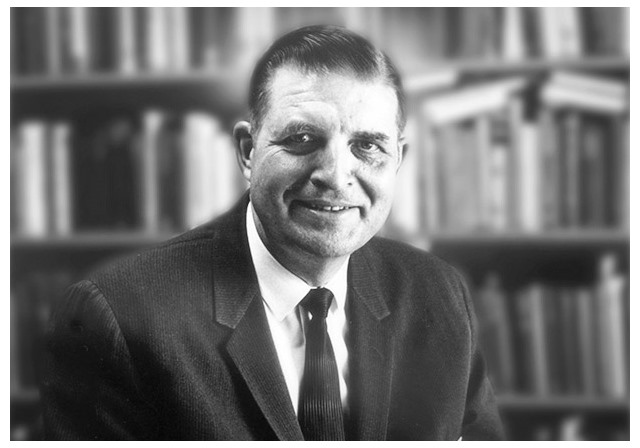Carl Ferdinand Howard Henry (1913–2003) was an American theologian in the conservative evangelical and Baptist tradition.
Born on Long Island into a nominally Methodist family, Henry was the child of Karl F. Heinrich and Johanna Vaethroeder (Väthröder). He showed exceptional promise as a journalist and became the editor of the Smithtown Star. At age 20, it was reputed that Henry was the youngest newspaper editor in America.
Henry came to faith in this heady period when a young evangelist befriended him and shared the gospel with him. He recalled his conversion many decades following: ”He told me about Christ as we drove around Long Island in my battered old Chevy,” Dr. Henry said in an interview with The New York Times in 1966. ”I knelt in the back of that car and dedicated myself to Jesus Christ. Life has not been the same since.” Life, and with it the evangelical movement in due time.
Henry studied at Wheaton College, earning both a bachelors and masters degree. During his time as a student, he met his future wife, Helga, a missionary kid. Henry went on to earn doctorates from Northern Baptist Theological Seminary and Boston University. He began his teaching career in 1942 and commenced a continuous cycle of evangelical scholarship and activism that would not quiet until his eighties. He was one of the founders of the National Association of Evangelicals in 1942. He was the founding academic dean of Fuller Theological Seminary, begun in 1947. In the same year, he published his landmark volume The Uneasy Conscience of Modern Fundamentalism. The book signaled the arrival of “new evangelicalism,” a gospel-focused, socially-conscious, culturally-engaged movement. With world-trotting evangelist Billy Graham and Park Street Church pastor Harold John Ockenga, Henry was one of the figures responsible for a sea change in post-war American Protestantism. Years later, it was reported that when lecturing on the origins of neo-evangelicalism, Henry—with some accuracy—would start the class with his birthdate.
Dr. Henry with Billy Graham and Dr. Albert Mohler, Jr.
Even as he taught philosophy of religion and theology at Fuller, Henry itched to exert broader influence on evangelical churches. In 1956, with the support of Billy Graham, he became the founding editor of Christianity Today, serving in this role from his Washington, D. C. office until 1968. The magazine was a runaway success under Henry’s leadership, quickly out-selling the rival Christian Century and becoming America’s best-read Christian newsmagazine. Early in his time in Washington, Henry became a member of Capitol Hill Baptist Church, a Southern Baptist congregation that he served for decades as a Sunday School teacher and lay leader.
It is difficult to overstate just how influential Henry became in this period. From 1948-56, he was co-chairman of the annual Sunrise Easter Service at the Rose Bowl in Pasadena, California; chairman of the 1966 Berlin Congress on World Evangelism, a forerunner of the Lausanne movement; was an advocate of the Chicago Statement on Biblical Inerrancy (1978), placing it in his six-volume magnum opus, God, Revelation, and Authority; was one of the founders (and was the first plenary speaker) of the Evangelical Theological Society (1949); was the founder of the Institute for Advanced Christian Studies (1967); served for years as theologian-at-large for World Vision International; and published over 30 volumes and near-countless articles, reviews, and essays.
Published in stages from 1976-1983, God, Revelation, and Authority was a treatment primarily of epistemology and the biblical revelation of God. In sum, this work of academic theology established Henry as “the dean of evangelical theologians” of the second half of the twentieth century in the estimation of former colleague Kenneth Kantzer, founding dean of Trinity Evangelical Divinity School.
Henry attained four honorary degrees and lectured in his later career across the world, becoming a truly global theologian by his visits to various seminaries and colleges. These included the Asian Center for Theological Studies and Missions, Bethel Theological Seminary, Christian Theological Seminary, Columbia Bible College, Denver Conservative Baptist Seminary, Gordon Divinity School, Hillsdale College, Hong Kong Baptist College, Latin American Theological Seminary, Soong Sil University, Eastern Baptist Theological Seminary, The Southern Baptist Theological Seminary, Trinity Evangelical Divinity School, and Winona Lake Summer School of Theology.
Henry died in 2003, with Helga following him to her reward not long after. Henry’s contributions live on in the current day, as theologians in the upper echelons of the academy continue to ponder his contributions to such doctrines as propositional revelation, foundationalism, the kingdom of Christ, the public square, and the relationship between church and the culture.



